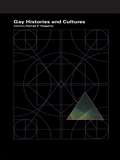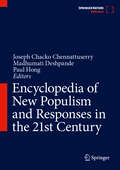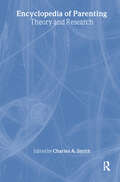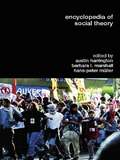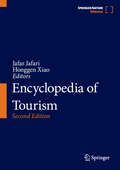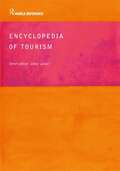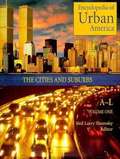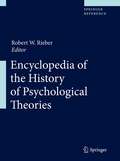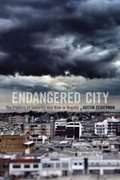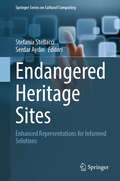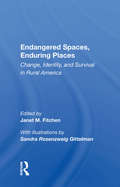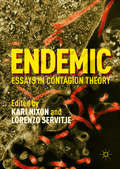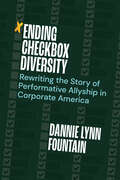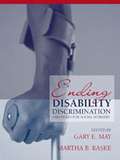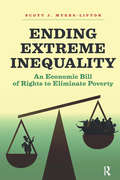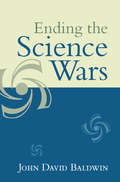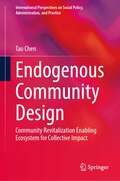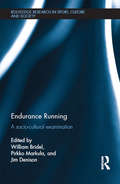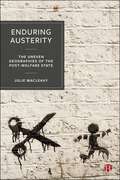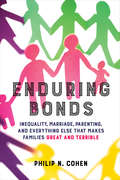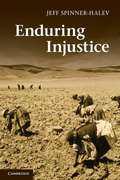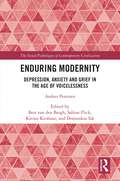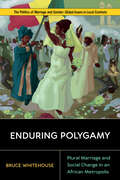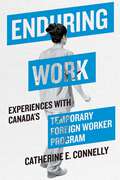- Table View
- List View
Encyclopedia of Lesbian and Gay Histories and Cultures
by George E. HaggertyBeginning in 1869, when the study of homosexuality can be said to have begun with the establishment of sexology, this Encyclopedia offers accounts of the most important international developments in an area that now occupies a critical place in many fields of academic endeavours. While gays and lesbians have shared many aspects of life, their histories and cultures developed in profoundly different ways. To reflect this crucial fact, the Encyclopedia has been prepared in two separate volumes assuring that both histories receive full, unbiased attention and that a broad range of human experience is covered.Written by some of the most famous names in the field, as well as new researchers this is intended as a reference for students and scholars in all areas of study, as well as the general public.
Encyclopedia of New Populism and Responses in the 21st Century
by Paul Hong Joseph Chacko Chennattuserry Madhumati DeshpandeThis book mainly seeks to explain, define and update the recurring forms of populism in the 21st century. Examples used in this Introduction are limited to English speaking countries. But populism's existent expressions are ecumenically global. Like any long-lasting perennial organism it is sturdy and comes in a variety of forms adaptable to environmental changes. In political or cultural terms its expression has been neither exclusively left, center, nor right. Populism contains multitudes, dates back centuries before it was identified with its modern name. Populism has become a hot button issue in the recent times. The UK's Sunday heavy The Guardian published about 300 articles in 1998 that used the term "populism" or "populist" and by 2016 its use had skyrocketed to over 2,000. And growing. Probably the single greatest catalyst to date that injected populism into the world's Internet common discourse, that infused it into journalism right, left and centerand awakened populist political activism was the Great Recession of 2007-08 and the subsequent global deprivations it engendered. In today's world populism promises to remain and renew its intensity due to the covid-19 pandemic's deleterious effects on most nations middle and low-income groups, specially minorities. These are some reasons among many why it is time for populism to be relocated, identified and given refreshed 21st understandings. It has a shifting nature among people, events, causes that constantly demands fresh studies. It is a social and cultural phenomenon both universal and particular. In our 21st century world it is a product of our shared cultures and each our own exceptional deep culture. This Encyclopedia is unique in its composition as it includes all the major disciplines of Social Sciences and thus will be a one stop source of nine different disciplines looking at new populism.
Encyclopedia of Parenting: Theory and Research
by Charles A. SmithParenting receives growing amounts of attention from researchers, and what was once considered chiefly an art is now also recognized for being a science. Our knowledge of parenting has increased significantly in the last few decades; new developments continue to happen daily. The Encyclopedia of Parenting provides, in reference book format, what we now know about parents, parenting, and the parent-child relationship, synthesized in some 250 alphabetically arranged entries. Each entry is written by an expert contributor and provides an authoritative overview of a particular topic. Subjects covered include: child activity; child outcomes; child states; parent behaviours; parental situations; external and community factors; systematic concerns; the transition to parenthood; available resources; persons who have added to our knowledge of the field. Entries draw on a wide range of disciplines, including psychology, education, and sociology. Each entry closes with a bibliography, and the volume concludes with a selected list of works for further reading.
Encyclopedia of Social Theory
by Austin Harrington Hans-Peter Müller Barbara L. MarshallThe Encyclopedia of Social Theory contains over 500 entries varying from concise definitions of key terms and short biographies of key theorists to comprehensive surveys of leading concepts, debates, themes and schools. The object of the Encyclopedia has been to give thorough coverage of the central topics in theoretical sociology as well as terms
Encyclopedia of Tourism
by Jafar Jafari Honggen XiaoThis encyclopedia is the most comprehensive and updated source of reference in tourism research and practice. It covers both traditional and emerging concepts and terms and is fully international in its scope. Some 769 entries by 871 internationally renowned experts from 124 countries provide a definitive access to the knowledge of tourism and its related fields. Users will find reliable and up-to-date definitions and explanations of the key terms of tourism in this reference book. Tourism is the largest industry in the world and is the main source of income for many countries. With the practical impact of worldwide tourism and the growing number of academic programs and institutions devoted to its education and research, this encyclopedia is the epicenter of this emerging and developing discipline. Editorial BoardManaging Editor: Amy Osmond Associate Editors: David Airey, Nevenka Cavlek, Peter U. C. Dieke, Juergen Gnoth, Maria Gravari-Barbas, Tazim Jamal, Kumi Kato, Francisco Madrid Flores, Yoel Mansfeld, Scott M. Meis, Regina Schlüter, Noel Scott, Honggang XuResource Editor: Beka JakeliAssistant Editors: S. Vida Muse, Peter Reim, Shun YeCartographers: Kisandul Kumarasinghe, Ashan Manamperi, Himanshi Withanage
Encyclopedia of Tourism
by Jafar JafariIn fewer than three hundred years tourism has become a global service industry of great economic, cultural and political importance. Published to critical acclaim, the Encyclopedia of Tourism - now available as a Routledge World Reference title - is the definitive one-volume reference source to this challenging multisectoral industry and multi disciplinary field of study. Comprising over one thousand entries, this volume has been written by an international team of contributors to provide a comprehensive guide to both the manifest and hidden dimensions of tourism. It explores the wide range of definitions, concepts, perspectives and institutions and includes: comprehensive coverage of key issues and concepts definitions of all terms and acronyms entries on the significant institutions, associations and journals in the field country-specific tourism profiles, from Greece to Japan and Kenya to Peru thorough analysis of the trends and patterns of tourism development and growth. The extensive cross-referencing and comprehensive index will assist the reader in making links between the diverse aspects of tourism studies, and the suggestions for further reading are invaluable.
Encyclopedia of Urban America: The Cities and Suburbs (Volume 2, M-Z)
by Neil L. ShumskyThis monumental work provides detailed definitions and context for the many terms and names encountered while studying the development and significance of the metropolis, the megalopolis, and, of course, the newly discovered edge city (among other strains of suburb). Includes 547 entries highlighting cultural and social phenomenon; economic and political issues; environmental concerns; transportation and infrastructure; ethnic and racial groups; the role of religion; and key figures in urban politics, literature, art, and music. The editor's introductory essay discusses the definition of urban and the development of urban studies.
Encyclopedia of the History of Psychological Theories
by Robert W. RieberThis work will survey the entire range of thinking in psychology, from ancient times to the present, encompassing philosophies and theories of mind that pre-date our modern conception of psychology as a science, and extending to the current findings of neuroscience. It will set the theories into their historical context and cross-reference key influences, such as Darwin's on Freud. Fifteen hundred entries will comprise key figures, theoretical concepts, false theories, historical events, and seminal writings. International in scope, this project will involve history of psychology experts from around the world and the coverage of topics will be set in global context. The aim will be to provide a reference work of more depth than discussions that are currently available in textbooks, with the ability to connect to a multitude of relevant topics. This work will provide a picture of psychology as it has emerged into the present time and position it among other related fields such as anthropology, sociology, philosophy, and medicine.
Endangered City: The Politics of Security and Risk in Bogotá
by Austin ZeidermanSecurity and risk have become central to how cities are planned, built, governed, and inhabited in the twenty-first century. In Endangered City, Austin Zeiderman focuses on this new political imperative to govern the present in anticipation of future harm. Through ethnographic fieldwork and archival research in Bogotá, Colombia, he examines how state actors work to protect the lives of poor and vulnerable citizens from a range of threats, including environmental hazards and urban violence. By following both the governmental agencies charged with this mandate and the subjects governed by it, Endangered City reveals what happens when logics of endangerment shape the terrain of political engagement between citizens and the state. The self-built settlements of Bogotá's urban periphery prove a critical site from which to examine the rising effect of security and risk on contemporary cities and urban life.
Endangered Heritage Sites: Enhanced Representations for Informed Solutions (Springer Series on Cultural Computing)
by Stefania Stellacci Serdar AydinThis book provides a thorough exploration of how heritage representation has evolved in the digital age, highlighting connections between diverse informed solutions for preserving and interpreting heritage knowledge. It provides a holistic overview of advanced surveying and visualization tools essential for decoding and analyzing cultural heritage data. Techniques such as remote sensing, heritage building information modeling (HBIM), knowledge graphs, and game-based learning can unveil the complex layers inherent in endangered heritage sites. Beyond these tools, the book examines policy perspectives that require critical review and collective efforts. A key focus of the contributions is the revolutionary role of the smart heritage information base as a new form of knowledge and practice. Enriched representations and integrated analyses have revolutionized heritage practices, moving beyond the traditional eidotypes that were prevalent until the first decade of the 21st century. The diverse array of the collected contributions in this book highlights a cultural and technical shift that represents a significant methodological and epistemological progress in the fields of digital humanities and heritage management. With insightful analyses of heritage sites, especially archaeological remains, through real-world case studies in Spain, Portugal, Turkey, Pakistan, and Israel, this book delves into the challenges posed by human-made induced disasters and natural hazards, offering valuable insights into safeguarding our cultural heritage. These case studies not only show the challenges local sites and communities face now and, in the future, but also enrich the discourse on how to protect our shared cultural heritage together. The advanced mapping and analysis of these case studies reveal the importance to unveil hidden narratives, protect collective values, and reshape perspectives on cultural heritage in the digital age. The target audience includes heritage practitioners, architects, archaeologists, urban planners, data scientists, researchers, academics, teaching institutions, and architecture students. Its international scope is reflected in contributions and editors from diverse locations. The thematic breadth appeals to a global readership interested in different theoretical and methodological approaches, complemented by a range of case studies across different cultural, economic, and environmental contexts and future scenarios.
Endangered Spaces, Enduring Places: Change, Identity, And Survival In Rural America
by Janet M. FitchenRural America as a place and a way of life is undergoing major transformation. The farm crisis and the decline of manufacturing dealt a double blow to the rural economy in the 1980s. Rural communities continue to lose farms, factories, and young people. Rural lands are increasingly being sought as places for vacation homes, state prisons, and waste dumps. Rural people are ambivalent about new residents and activities that are coming in and unsure of their own rural identity. Old assumptions about rural life and rural community are now open to question. Based on years of field observations and hundreds of interviews in fifteen rural counties in upstate New York, Fitchen's book explores these interconnected changes. It describes the financial stress in dairy farming and the efforts families made to hold onto their farms. It records the stunned disbelief and difficult adjustment of rural factory workers and small communities as local plants shut down. The author chronicles the struggles of communities plagued by toxic chemicals in their drinking water and of young families slipping farther into poverty. She reports on some communities that are campaigning to "win" a state prison and others that are protesting against a proposed radioactive waste dump. The book illustrates the persistence of rural ingenuity and determination but argues that these alone cannot solve the problems of rural America. A well-informed federal and state commitment is necessary. With policies and programs appropriate for rural situations, most communities could adapt creatively to the changes, integrate around a new rural identity, and survive into the twenty-first century as enduring social settings for their residents.
Endemic
by Kari Nixon Lorenzo ServitjeThis book develops a new multimodal theoretical model of contagion for interdisciplinary scholars, featuring contributions from influential scholars spanning the fields of medical humanities, philosophy, political science, media studies, technoculture, literature, and bioethics. Exploring the nexus of contagion's metaphorical and material aspects, this volume contends that contagiousness in its digital, metaphorical, and biological forms is a pervasively endemic condition in our contemporary moment. The chapters explore both endemicity itself and how epidemic discourse has become endemic to processes of social construction. Designed to simultaneously prime those new to the discourse of humanistic perspectives of contagion, complicate issues of interest to seasoned scholars of science and technology studies, and add new topics for debate and inquiry in the field of bioethics, Endemic will be of wide interest for researchers and educators.
Ending Checkbox Diversity: Rewriting the Story of Performative Allyship in Corporate America
by Dannie Lynn FountainDEI isn't just a box to check.As a triple minority who passes for a straight white woman in corporate America, Dannie Lynn Fountain has seen too many companies pretend to care about diversity, equity, and inclusion (DEI) only for its public relations outcomes. In Ending Checkbox Diversity, Fountain explores how the current structure of corporate DEI lends itself to the continued oppression of marginalized identities. She examines the narrow objectives and metrics that allow for shallow or no improvement and how shifting diversity responsibility to employee resource groups enables companies to disclaim responsibility for making meaningful progress. She looks at the impact of Zennials and Gen Zers, the most diverse generations ever, and breaks down precisely why some notable examples of poor DEI initiatives failed (and what should have been done differently). And she builds a road map for what real DEI looks like and how to avoid the performative allyship trope.
Ending Disability Discrimination: Strategies For Social Workers
by Gary E. May Martha B. RaskeEnding Disability Discrimination defines disability as a social construction, not as an immutable physical limitation, and gives social work students and practitioners a model that can be used to transform how people with disabilities are treated.
Ending Extreme Inequality: An Economic Bill of Rights to Eliminate Poverty
by Scott Myers-LiptonPoverty and inequality are at record levels. Today, forty-seven million Americans live in poverty, while the median is in decline. The top 20 percent now controls 89 percent of all wealth. These conditions have renewed demands for a new economic Bill of Rights, an idea proposed by F. D. Roosevelt, Truman and Martin Luther King, Jr. The new Economic Bill of Rights has a coherent plan and proclaims that all Americans have the right to a job, a living wage, a decent home, adequate medical care, good education, and adequate protection from economic fears of unemployment, sickness and old age. Integrating the latest economic and social data, Ending Extreme Inequality explores each of these rights. Each chapter includes: an analysis of the social problems surrounding each right; a historical overview of the attempts to right these wrongs; and assessments of current solutions offered by citizens, community groups and politicians. These contemporary, real-life solutions to inequality can inspire students and citizens to become involved and open pathways toward a more just society.
Ending the Science Wars
by John D. BaldwinThe "science wars" have been raging for decades, raising many questions about the power of science. Some critics claim that science, including social science, is "merely a social construction" that fallible humans have created with words and other symbols. If this is true, is science as formidable a source of knowledge as most scientists claim? Baldwin explains why the edifice of science has robust properties that make it one of the most useful forms of knowledge that humans have ever created, although it is not perfect. He trenchantly examines all sides of the debate and uses the philosophy of pragmatism to reveal the special characteristics that make science work as well as it does. Ending the Science Wars shows how science is far better grounded than its critics claim. The book not only helps resolve many current debates about science, it is a major contribution for explaining science in terms of a powerful philosophical system. This makes the book valuable to scientists in all fields of research-and intellectually challenging for science's critics.
Endogenous Community Design: Community Revitalization Enabling Ecosystem for Collective Impact (International Perspectives on Social Policy, Administration, and Practice)
by Tao ChenThis book is a comprehensive exploration of endogenous community building, aiming to investigate how to create a vibrant, service-integrated, and sustainable community through collective impact approaches. It’s a guide to social innovation that combines theory and practical application. In terms of theory, it constructs concepts such as endogenous community, endogenous design system, life project platform and enabling ecosystem. In practice, it offers design methods and a toolkit for collective impact to enhance community resilience and capacity through service co-creation. This book provides readers with a systematic guide to endogenous community design, ranging from conceptual understanding and theoretical models to practical methodologies. Its aim is to build a sociotechnical system from the bottom-up to address complex issues.This book is ideal for community leaders, government officials, NGOs, urban planners, social innovators, and anyone passionate about sustainable community development.
Endurance Running: A Socio-Cultural Examination (Routledge Research in Sport, Culture and Society)
by Pirkko Markula William Bridel Jim DenisonRunning is a fundamental human activity and holds an important place in popular culture. In recent decades it has exploded in popularity as a leisure pursuit, with marathons and endurance challenges exerting a strong fascination. Endurance Running is the first collection of original qualitative research to examine distance running through a socio-cultural lens, with a general objective of understanding the concept and meaning of endurance historically and in contemporary times. Adopting diverse theoretical and methodological approaches to explore topics such as historical conceptualizations of endurance, lived experiences of endurance running, and the meaning of endurance in individual lives, the book reveals how the biological, historical, psychological, and sociological converge to form contextually specific ideas about endurance running and runners. Endurance Running is an essential book for anybody researching across the entire spectrum of endurance sports and fascinating reading for anybody working in the sociology of sport or the body, cultural studies or behavioural science.
Enduring Austerity: The Uneven Geographies of the Post-Welfare State
by Julie MacLeavyLooking at how austerity has become embedded in institutional practices, this book offers new critical insights into the uneven geographies created by austerity. Reflecting on the spatially and socially uneven impacts of austerity on individuals and families, Julie MacLeavy shows how the ‘new normal’ of post-welfare state governance will negatively condition life chances, even in better economic times. She considers the political, economic and social developments that have led us to the present moment and shows how the rhetoric of austerity has pushed social inequality and uneven development off the political agenda.
Enduring Bonds: Inequality, Marriage, Parenting, and Everything Else That Makes Families Great and Terrible
by Philip N. CohenIn Enduring Bonds, Philip N. Cohen, renowned sociologist and blogger of the wildly popular and insightful Family Inequality, examines the complex landscape of today's diverse families. Through his interpretive lens and lively discussions, Cohen encourages us to alter our point of view on families, sharing new ideas about the future of marriage, the politics of research, and how data can either guide or mislead us. Deftly balancing personal stories and social science research, and accessibly written for students, Cohen shares essays that tie current events to demographic data. Class-tested in Cohen’s own lectures and courses, Enduring Bonds challenges students to think critically about the role of families, gender, and inequality in our society today.
Enduring Empire
by David Tabachnick Toivo KoivukoskiAn exploration of the ways in which ancient theories of empire can inform our understanding of present-day international relations, Enduring Empire engages in a serious discussion of empire as it relates to American foreign policy and global politics. The imperial power dynamics of ancient Athens and Rome provided fertile ground for the deliberations of many classical thinkers who wrote on the nature of empire: contemplating political sovereignty, autonomy, and citizenship as well as war, peace, and civilization in a world where political boundaries were strained and contested. The contributors to this collection prompt similar questions with their essays and promote a serious contemporary consideration of empire in light of the predominance of the United States and of the doctrine of liberal democracy.Featuring essays from some of the leading thinkers in the fields of political science, philosophy, history, and classics, Enduring Empire illustrates how lessons gleaned from the Athenian and Roman empires can help us to understand the imperial trajectory of global politics today.
Enduring Injustice
by Jeff Spinner-HalevGovernments today often apologize for past injustices and scholars increasingly debate the issue, with many calling for apologies and reparations. Others suggest that what matters is victims of injustice today, not injustices in the past. Spinner-Halev argues that the problem facing some peoples is not only the injustice of the past, but that they still suffer from injustice today. They experience what he calls enduring injustices, and it is likely that these will persist without action to address them. The history of these injustices matters, not as a way to assign responsibility or because we need to remember more, but in order to understand the nature of the injustice and to help us think of possible ways to overcome it. Suggesting that enduring injustices fall outside the framework of liberal theory, Spinner-Halev spells out the implications of his arguments for conceptions of liberal justice and progress, reparations, apologies, state legitimacy, and post-nationalism.
Enduring Modernity: Depression, Anxiety and Grief in the Age of Voicelessness (The Social Pathologies of Contemporary Civilization)
by Anders PetersenThis book brings together the work of the late Anders Petersen, presenting his exciting and innovative transdisciplinary paradigm that offers insights into anxiety, depression and grief, and the connection between these conditions and the failings of contemporary civilization that give rise to them. With attention to the ways in which neoliberal hegemony and its imperatives of ‘performance’, ‘evaluation’, ‘self-realisation’, ‘resilience’ and ‘flexibility’ lead to self-criticism on the part of those who do not measure up to the prevailing criteria, resulting in ailments of mental health, it challenges the paradigmatic diagnosis of such conditions in terms of individual diseases or neurological malfunctions, to be treated by medication and training in order to return the individual to work and life ‘as normal’. An examination of the wrong-headed approach to what Petersen analysed as contemporary social pathologies, Enduring Modernity: Depression, Anxiety and Grief in the Age of Voicelessness will appeal to scholars of sociology and social theory, seeking new understandings aimed at emancipation from social suffering.
Enduring Polygamy: Plural Marriage and Social Change in an African Metropolis (Politics of Marriage and Gender: Global Issues in Local Contexts)
by Bruce WhitehouseWhy hasn’t polygamous marriage died out in African cities, as experts once expected it would? Enduring Polygamy considers this question in one of Africa’s fastest-growing cities: Bamako, the capital of Mali, where one in four wives is in a polygamous marriage. Using polygamy as a lens through which to survey sweeping changes in urban life, it offers ethnographic and demographic insights into the customs, gender norms and hierarchies, kinship structures, and laws affecting marriage, and situates polygamy within structures of inequality that shape marital options, especially for young Malian women. Through an approach of cultural relativism, the book offers an open-minded but unflinching perspective on a contested form of marriage. Without shying away from questions of patriarchy and women’s oppression, it presents polygamy from the everyday vantage points of Bamako residents themselves, allowing readers to make informed judgments about it and to appreciate the full spectrum of human cultural diversity.
Enduring Work: Experiences with Canada’s Temporary Foreign Worker Program
by Catherine E. ConnellyIf you believed most of what’s said about the Canadian Temporary Foreign Worker program, you might naturally assume that there is a trade-off between workers’ poor experiences with the program and employers’ significant benefits. In reality, the experiences of workers are far worse than is commonly acknowledged, while employers are not reaping as much benefit as the public might suppose.In Enduring Work Catherine Connelly draws on over one hundred interviews with people connected to different aspects of this program, analyzing their experiences from the perspective of organizational behaviour and human resources management. She compares the lived reality of agricultural workers, in-home caregivers, and low- and high-wage workers, showing how and why each group is vulnerable to mistreatment, albeit in different ways. She further explores how employment agencies and immigration consultants contribute to program abuses. Critically, Enduring Work provides the perspectives of employers, distinguishing between the reluctant users of the program who follow the rules and the reckless users who do not.Groundbreaking in its analysis of an issue very much in the news, Enduring Work unpacks the harms within Canada’s Temporary Foreign Worker program and offers nuanced strategies to improve it.
